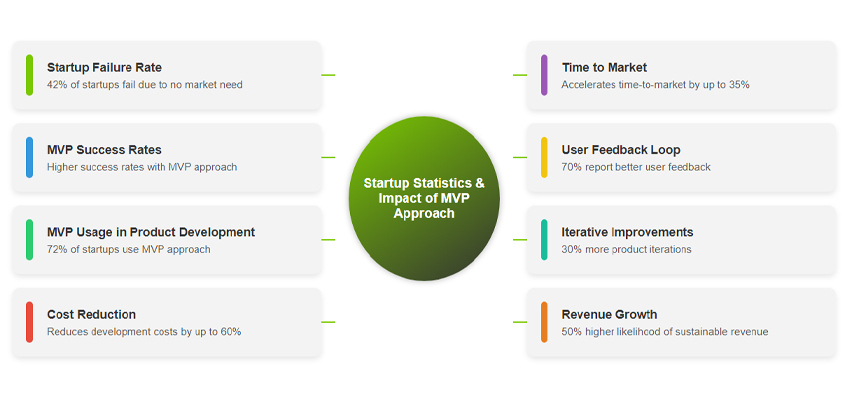From MVP to market: real-world success and startup survival statistics
The Power of MVPs
For any new company, the first steps of developing a product are challenging. There are important choices and risks involved. At Software Development Hub (SDH), we know the power of launching with a Minimum Viable Product (MVP). The MVP approach lets startups test their ideas and demand. It reduces the risk of failure while saving time and money on development. Gartner's research backs this approach. SDH helps guide startups through the MVP process. This ensures their products match what the market and users need.
Backed by insights from Gartner’s research, SDH is committed to guiding startups through the strategic MVP development process, ensuring their products align with real market needs and user expectations.
Why Do Startups Fail?
The startup world is thrilling yet tough. Research shows around 42% of startups fail due to not having a market need for their product. This shows why it's key to validate your idea early on when building a successful business.
An MVP is a simplified version of a product. It focuses on solving the main user issues. Startups use an MVP to get real feedback from their target users. This helps them know if their product meets a real market need. They can then adjust their product before investing more resources in further development.
Key MVP Statistics for Startups

Understanding the value of an MVP is one thing, but seeing the data behind this approach’s impact is essential. Here are some key statistics about MVPs and their benefits for startups:
- MVP Success Rates
Startups that use an MVP have a better chance of success. With an MVP, they can test ideas early on. This helps them avoid building features that don't interest their audience. Using an MVP reduces the risk of creating things that customers don't want. - MVP Usage in Product Development
Approximately 72% of startups use an MVP approach. They get feedback to refine their product and avoid mistakes. This process lets startups focus on what users need. This creates a stronger chance of long-term success for their product. - Cost Efficiency
MVPs can lower development costs up to 60% compared to traditional product development. For startups with limited budgets, this cost efficiency is very useful. MVPs develop only key features. They get feedback and keep refining based on it. This ensures resources go to solutions that solve real user problems. - Time-to-Market Advantage
Startups can use an MVP approach. This helps them get to market faster - by about 35%. Rather than spending a long time developing a product, startups can release a basic version quickly. This helps them get customer feedback and visibility. It can even get them some initial customers faster.
Learning Through Feedback
One of the main benefits of an MVP is it creates feedback between users and developers. Gartner says around 70% of companies using an MVP get better user insights. This feedback is valuable. It lets startups change their product quickly. This keeps the product in line with what the market wants. Early feedback can also show hidden user needs. This lets startups adjust their product before spending more money.
Iterative Development
The MVP approach focuses on making products in steps. Companies that use MVPs can keep improving their products. Startups using MVPs have 30% more product changes than those using traditional methods. Each change lets them add or improve features based on user data. This helps avoid making things users don't need. The step-by-step process creates a product that fits users' needs well. This increases the chances of the product succeeding in the market.
Revenue Validation
Revenue generation is often the ultimate goal for startups, and the MVP approach can play a key role in validating revenue models. Startups that use MVPs to test pricing assumptions and value propositions are approximately 50% more likely to achieve sustainable revenue models. By understanding what features customers are willing to pay for, companies can make informed decisions about pricing strategies and revenue streams early on. Testing revenue models with an MVP helps startups build a foundation for long-term profitability, reducing the risk of costly missteps when the full product is launched.
Revenue is often the main goal for new businesses. The MVP approach can help test revenue models. Startups using MVPs to test prices and features are 50% more likely to have sustainable revenue. This helps them understand what customers will pay for. Companies can then make smart choices about pricing and revenue early on. Testing revenue with an MVP builds a foundation for long-term profit. This reduces the risk of mistakes when the full product launches.
How an MVP Accelerates Startup Success: Key Benefits
To better understand how an MVP can expedite a startup's journey to success, let’s look at the key benefits in detail:
- Lower Financial Risks
Developing a full product from scratch can require a significant investment, and if the product fails to gain traction, the financial repercussions can be substantial. An MVP allows startups to launch a basic version of the product with only essential features, thereby lowering upfront costs. This approach reduces the initial investment required, helping startups allocate their budgets effectively.
- Faster Time-to-Market
Speed is very important for startups. An MVP lets startups get their product to early users faster. This allows them to test the market quickly. This quick launch gives startups an advantage. It also helps them start building their brand and getting early customers sooner. These are both key for long-term growth.
- Real-Time Market Validation
The goal of an MVP is to test the main benefits of a product in real markets. This helps startups make sure their solution meets actual customer needs. This reduces the risk of creating unwanted or unnecessary features. By testing the product idea early, startups can make changes as needed. This helps them be more successful.
- Enhanced Flexibility and Scalability
The MVP approach allows for flexibility, making it easy to pivot or adjust the product based on user feedback. Whether it's adding new features, refining existing ones, or even changing the product’s direction, an MVP facilitates growth by ensuring that development is driven by user needs rather than assumptions.
SDH – Your Partner in MVP Development
At Software Development Hub, we're more than just developers. We're strategic partners for startups building successful MVPs. Our team specializes in guiding startups through the complexities of MVP development. We provide expertise and support to help them build a focused, market-ready product. This minimizes risk and maximizes growth potential. We combine technical expertise with a deep understanding of the startup ecosystem. This ensures each MVP aligns with business goals and market demands.
Our Approach
- Discovery Phase: We begin by understanding your product vision, objectives, and target market. Our team works closely with you to identify essential features and prioritize functionalities that support your core value proposition.
- Agile Development: Using agile methodologies, we ensure that development progresses rapidly without sacrificing quality. We keep you updated throughout the process, allowing for adjustments based on evolving requirements or market changes.
- Testing and Validation: Before the MVP launch, we do careful testing. This checks if it meets quality and works right. We also get user feedback early. This helps guide future changes. The MVP improves based on real data.
- Post-Launch Support: Our support doesn’t end with the launch. We help monitor performance, gather user insights, and assist with any modifications or feature additions based on post-launch feedback.
Let’s Build Your MVP Together
The power of an MVP can speed up a startup's success. An MVP lets you test ideas quickly. You can develop your product step-by-step. This costs less than building the whole thing at once. An MVP helps you understand what customers really want. With SDH, you have a team to support your MVP. They are dedicated to making your product successful.
Armed with data and experience, we're here to help you quickly bring your idea to market in a smart way. Let's make an MVP that tests your idea and turns it into a good, market-ready product. With us as your partner, your startup is set up for fast success.
Cases and datas are taken from Gartner's official website.
Categories
About the authors
Share
Need a project estimate?
Drop us a line, and we provide you with a qualified consultation.









